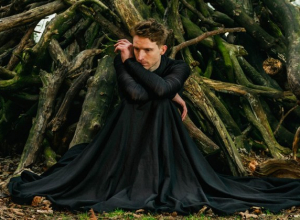The Lord of the Rings Retrospective
By Lenny Barksdale in Movies / TV / Theatre on 05 September 2021
The Lord of the Rings trilogy is arguably the pinnacle of filmmaking, and while the movie industry is inherently subjective, the LOTR might be the one exception to this rule.

The Lord of the Rings trilogy is arguably the pinnacle of filmmaking, and while the movie industry is inherently subjective, the LOTR might be the one exception to this rule.
Even to this day, no films have managed to replicate the pure thrill that the films invoke, though many have come close. In the absence of anything that can match the greatness of TLOTR, it might be interesting to look back at those wonderful films and ponder upon what made them so good, a notion evidenced by the last instalment winning a remarkable total of eleven Oscars.
The film industry is growing, despite the setbacks of the recent pandemic. This growth mirrors other industries, such as gambling, find a great online casino option here, and can be attributed to excellent films that have been released this year such as The Father and Judas and the Black Messiah.
It is important to understand the context of the industry before the TLOTR films came out. Fantasy films were not typically known for performing well when it came to giving out awards, that privilege was held by more serious genres such as drama and thriller. Fantasy was practically not seen at the level that the TLOTR would show, but this makes sense when the source material is considered. TLOTR books are considered high fantasy, meaning that the scope of its fantastical setting is enlarged many times over. J.R.R Tolkien, the author of those books, set the standard for high fantasy when they were released in the last century, and Peter Jackson, the director of the film versions, did much of the same thing when the films came out during the last decade. It is evident then, that much of the success the films enjoyed can be attributed to the framework that the books had set nearly 100 years before. But what else is there?
The feeling that is achieved when watching TLOTR is simply indescribable and is the result of many perfect pieces of the film coming together. This is remarkable when considering the woes that production saw, such as not getting the first-choice actor for the lead character or taking months to film one battle scene. Despite these issues, it would seem that the film was fated to succeed. The actor that came in, Viggo Mortensen, proved to be an instant hit and portrayed Aragorn better than anyone could have hoped. The Battle of Helms Deep also remains a shining example of how to do battle scenes on the big screen, and no piece of media has managed to come close to the epic nature of the scene.
From Jackson’s varied, clinical directing style to Howard Shore’s memorising, enchanting soundtrack, all parts of TLOTR have been perfected, resulting in a film that could not fail. The story that was told in the early noughties will stay with many for the rest of their lives, and the achievements they managed in the industry will be a benchmark that other films strive towards. It should be noted that virtually no trilogies have come close to reaching the heights that TLOTR achieved, but only time will tell if the films retain their throne as the best the industry has to offer.
Contactmusic
Suggested

Leisure Festival - Dreamland in Margate
On the same day that Glastonbury welcomed back Margate's adopted sons, The Libertines, Margate itself put on it's very own Leisure Festival as it...

Pretty Fierce talk to us about collaborating with Doja Cat, emetophobia, arena tours and staying "true to yourself" [EXCLUSIVE]
Sheffield's very own all girl group Pretty Fierce are still on a high after the recent release of their debut single - 'Ready For Me'.

Will Varley & Jack Valero - The Astor Theatre Deal Live Review
Three nights before the end of his current tour Will Varley returned to his home town of Deal to delight a sold out crowd in The Astor Theatre.

WYSE talks to us about her "form of synaesthesia", collaborating with Radiohead's Thom York and the prospect of touring with a band [EXCLUSIVE]
With only a few days to go before Portsmouth based songstress and producer WYSE releases her new single, 'Belladonna', we caught up with her to find...
Advertisement

Bay Bryan talks to us about being a "wee queer ginger", singing with Laura Marling and being inspired by Matilda [EXCLUSIVE]
Colorado raised, Glasgow educated and Manchester based Bay Bryan is nothing if not a multi-talented, multi-faceted artist performing as both...

Keelan X talks to us about staying true to "your creative vision", collaborating with Giorgio Moroder and being "a yoga nut" [EXCLUSIVE]
Former Marigolds band member Keelan Cunningham has rediscovered his love of music with his new solo project Keelan X.
![Luke De-Sciscio talks to us about having the courage to be yourself, forgiving that which is outside of one's control and following whims [EXCLUSIVE] Luke De-Sciscio talks to us about having the courage to be yourself, forgiving that which is outside of one's control and following whims [EXCLUSIVE]](https://images.contactmusic.com/images/home/homepage/luke-de-sciscio-abof-a.jpg)
Luke De-Sciscio talks to us about having the courage to be yourself, forgiving that which is outside of one's control and following whims [EXCLUSIVE]
Wiltshire singer-songwriter Luke De Sciscio, formally known as Folk Boy, is set to release is latest album - 'The Banquet' via AntiFragile Music on...

Annie Elise talks to us about the challenges a female producer has to face and "going through a year of grief and sickness" [EXCLUSIVE]
Electronic music pioneer and producer Annie Elise says that the release of her first EP - 'Breathe In, Breathe Out' feels "both vulnerable and...
Advertisement
